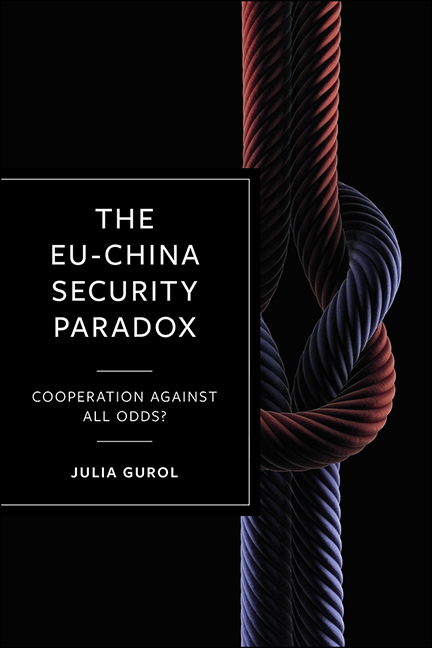Book contents
- Frontmatter
- Contents
- List of Figures
- List of Tables
- List of Abbreviations
- About the Author
- Acknowledgements
- 1 The EU and China in a Changing International Environment
- 2 Analytical Framework: Towards Multidimensionality
- 3 The EU’s and China’s Foreign and Security Policy Principles
- 4 The EU and China on the Global Stage: Interests and Interdependence
- 5 Framing and Perceptions in EU–China Security Relations
- 6 EU–China Relations on Anti-Terrorism
- 7 EU–China Relations on Maritime Security and Anti-Piracy
- 8 EU–China Relations on Climate and Energy Security
- 9 The US: An Elephant in the Room for EU–China Security Relations
- 10 Conclusion and Outlook: The EU and China at a Crossroads
- Notes
- References
- Index
10 - Conclusion and Outlook: The EU and China at a Crossroads
Published online by Cambridge University Press: 15 September 2022
- Frontmatter
- Contents
- List of Figures
- List of Tables
- List of Abbreviations
- About the Author
- Acknowledgements
- 1 The EU and China in a Changing International Environment
- 2 Analytical Framework: Towards Multidimensionality
- 3 The EU’s and China’s Foreign and Security Policy Principles
- 4 The EU and China on the Global Stage: Interests and Interdependence
- 5 Framing and Perceptions in EU–China Security Relations
- 6 EU–China Relations on Anti-Terrorism
- 7 EU–China Relations on Maritime Security and Anti-Piracy
- 8 EU–China Relations on Climate and Energy Security
- 9 The US: An Elephant in the Room for EU–China Security Relations
- 10 Conclusion and Outlook: The EU and China at a Crossroads
- Notes
- References
- Index
Summary
China's rise a global power is arguably one of the most important international developments of our time. Going from the world's largest developing power to an emerging pillar of world politics, China is on its way to becoming a new superpower with the potential to challenge the current world order. In line with this development, a widespread debate has emerged concerning the implications of China's rise. With regard to the EU, these implications have been discussed primarily in terms of economic relations, neglecting the changing relationship of the EU and China in the security realm. Similarly, cooperation in EU–China relations has hitherto received scant academic attention, with most European research outputs focusing on the challenges, risks and threats emanating from China and its increased international engagement. The ambition of this book was to disentangle the complex Sino-European relationship in the security realm and to explore and explain the modes and mechanisms that lead to cooperation between the EU and China beyond the scope of trade and investment. It was driven by the presumption that EU–China security cooperation is not a normative agenda, but rather an empirical issue (Christiansen et al, 2019). To answer it, we had to probe deeper into various security dimensions. The purpose of this concluding chapter is to bring together and compare the individual analytical chapters and to combine temporal patterns with the findings from the cross-sectional analyses of three exemplary security issues. Based on the preceding analyses, the chapter seeks to put the book's main findings in a wider context and points towards the potential and challenges of future avenues for the development of EU–China security relations.
The chapter begins by briefly summing up the main findings of the analytical chapters. The analytical chapters of this book have shown how complex and multifaceted EU–China relations in general and security relations in particular are. While economy and trade remain firmly at the heart of EU–China relations, the security dimension of their relationship is also considerable. Having developed a solid and institutionalized partnership, interest often seems to trump values when it comes to cooperation.
- Type
- Chapter
- Information
- The EU-China Security ParadoxCooperation against All Odds?, pp. 149 - 153Publisher: Bristol University PressPrint publication year: 2022



